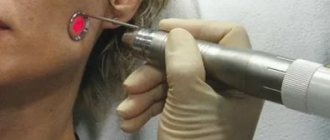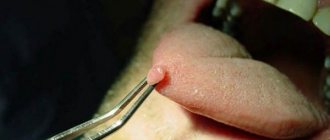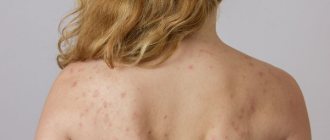When is it necessary to go to the hospital?
Acne is not a cosmetic problem, but only an external manifestation of processes occurring inside the body. The human body is smart; it reacts with pain, allergies, nausea, skin rashes and other unpleasant ways to factors that interfere with work and threaten health. These manifestations are stronger and nastier, the higher the threat. Therefore, if one pimple can be ignored, then a scattering of acne that appears suddenly should alert you and become a cause for concern. Having learned to listen to your own body, see if the rash is an allergy to a food product or cosmetic product? Finding out this is usually not difficult, because such reactions manifest themselves quickly and it is not difficult to guess the relationship. These pimples disappear after the irritating factor is eliminated and do not require special therapy other than limiting contact with the allergen. The exception is exotic cases of allergies to foods and substances that are difficult to refuse: specific medications, water, your own sweat, and so on.
In other cases, skin rashes that appear suddenly, in large quantities and are not an allergic reaction, signal the need to see a doctor. Advanced cases of acne leave scars, age spots and scars on the skin, which are difficult to remove.
Sometimes, acne appears and disappears on its own after a while. This can be misleading that the problem resolved itself and the body coped with it on its own. If this is not teenage acne, which in most cases actually goes away after the hormonal levels stop “storming”, then the likelihood of a relapse is high and it will happen during the next period of exacerbation of the original source disease.
Which doctor should I consult for acne?
Going to a beauty salon in hopes of solving your acne problem is a mistake. Acne is not a skin defect, but a disease that requires a comprehensive solution based on the findings of several specialists. A good cosmetologist can eliminate the effects of acne after appropriate treatment. Tighten, refresh, nourish skin that has lost its elasticity and dried out by medications, too. But eliminating the cause of acne formation is not within his competence. Do not resort to products that promise to cure your problem cosmetically. By throwing away a lot of money, you will get a temporary result, and the root of the pathology will progress during this time.
If any skin problems occur: acne, boils, blackheads, blisters, you should visit a dermatologist. It is he who, after examination and conversation, will identify possible factors that provoked the rash and will issue referrals to the appropriate specialists and for some tests, within his competence.
The dermatologist, depending on the type, complexity of the rash and other signs, will refer the patient to other specialized specialists.
- Gastroenterologist. There are often cases when rashes are the result of improper functioning of the digestive organs. Such pathologies lead to the fact that more toxins are released through the skin, which it cannot cope with, reacting with acne;
- Endocrinologist. Hormones are the most common cause of acne formation, therefore a trip to this doctor is inevitable and comes second after visiting a dermatologist. Treatment by this doctor for adolescents in puberty will be of little use, since it is difficult to influence the androgen hormone, which is responsible for the formation of juvenile acne;
- Gynecologist. Inflammatory processes on the skin in women, especially in adulthood, are sometimes caused by gynecological problems. Fluctuations in hormonal levels that provoke dermatological reactions can be caused by: the formation of polyps, the approach of menopause or menstruation, as well as other factors that only this doctor can identify.
Making a diagnosis and prescribing treatment
When all the studies and tests are done, doctors make diagnoses and prescribe the required treatment. A person with acne may be treated by several specialists at once or by just one dermatologist. Consultations and recommendations from all specialists are very important for choosing the right acne treatment tactics. Treatment takes quite a long time and after the condition improves it cannot be stopped. Treatment may include: hormone therapy, retinoids, antibiotics, topical skin care products with fruit acids, benzene peroxide and zinc oxide.
What tests will you need to take?
Each of the specialists listed above, after an appropriate examination in the office, will write out directions for tests or procedures that will help identify the possible cause of skin rashes. Don't be intimidated by the number of examinations and take the time to take them.
The dermatologist or doctor to whom he writes a referral will necessarily prescribe a general detailed blood test. This procedure reveals inflammatory processes in the body, viral diseases, bacterial infections, blood and liver diseases;
- The same specialist will prescribe a blood test for biochemistry. With its help, information is obtained about the functioning of internal organs: gall bladder, liver, kidneys, pancreas;
- If, in a conversation with a doctor, it was revealed that, in addition to extensive skin rashes, the patient is worried about frequent respiratory diseases, general weakness, and chronic diseases, then a blood test is prescribed for HIV infection;
- A specific rash, ulcers, multiple papules are symptoms of secondary syphilis, therefore, with similar skin manifestations, a test for CSR is often prescribed;
- Bacteria that live on the skin and do not cause any discomfort under normal conditions sometimes become aggressive. A sharp increase in their population on the surface of the epidermis leads to diseases characterized by skin rashes. Demodex skin mites, staphylococcus, acne bacteria and other microorganisms can “get off the leash”. To identify a specific type of pathogenic microorganism, the dermatologist prescribes taking a scraping for culture;
- Problems with the thyroid gland caused by a lack of iodine lead to disruption of hormone production. A change in their quantity affects the condition of the skin and leads to the formation of ulcers. Therefore, sometimes an endocrinologist prescribes an analysis of the amount of thyroid hormones to determine its condition and quality of work;
- Despite the variety of causes that cause acne and other skin reactions, hormonal imbalance is the leading among them. It is sex hormones that cause teenage acne, and they often provoke the appearance of acne in adults of both sexes. Therefore, tests for sex hormones are an integral part of diagnosing dermatological problems.
It is impossible to reliably determine the cause of acne without laboratory tests. Without medical intervention, at home, it is only possible to stop skin reactions, leaving the provoking disease unattended. Tests prescribed by a doctor will reveal the cause and help set the correct course of treatment.
Among women
Most women experience uncomfortable acne before and after their periods. This is how the body responds to fluctuations in the level of steroid hormones.
If a woman’s body is not prone to acne, then several pimples appear during this period. This is the norm and does not require examination or treatment. If there is a predisposition, the rashes will be profuse.
A woman over 28 years old should not be bothered by this problem. Therefore, if multiple acne appears, you should seek help from specialists. At this age, acne indicates serious diseases that change the hormonal levels in the body.
The cause of the rash may be polycystic ovary syndrome or pelvic inflammatory disease. In this case, you need to undergo examination and receive adequate treatment.
Significant changes in hormonal levels can occur after an abortion. There are hormonal changes in pregnant women, but a rash does not always occur.
What sex hormones are tested for acne?
Hormonal imbalances occur in people of all ages, not just teenagers. They can be provoked by:
- stress;
- pathologies of internal organs;
- inflammatory processes;
- pregnancy;
- lactation;
- stopping taking oral contraceptives;
- steroid use by athletes;
- other reasons.
When diagnosing the causes of acne, it is important to get tested for steroid hormones and testosterone levels. Most often, these two substances cause acne. But disruptions in the production of estradiol, cortisol, follicle-stimulating hormone, prolactin and other hormones also affect the quality of the skin.
Steroid hormones
This group of hormones includes corticosteroids, androgenic (male) and estrogenic (female). It is worth noting that both groups of hormones are produced in both male and female bodies, but their level is different for each sex. Male hormones have a particular influence on the condition of the skin.
The mechanism of acne formation can be simplified as follows. For some reason, the production of sebum increases or its quality changes, which leads to clogging of the sebaceous ducts. The situation can be aggravated by pathogenic organisms living on the skin, failure to follow personal hygiene rules, and concomitant diseases. Male hormones directly affect the functioning of the sebaceous glands, accelerating the production of their secretion, which becomes thicker. The epidermis cannot cope with the increased load and does not have time to bring sebum to the surface.
Testosterone level
This biologically active substance is also a male sex hormone, and the mechanism of its effect on the skin is similar to those described above. It is this substance that is responsible for sexual desire, the formation of secondary sexual characteristics in boys and girls, and is responsible for aggression. The level of this substance largely depends on genetic predisposition. Therefore, if the father suffered from skin rashes in his youth, there is a high probability that his son will not suffer from this problem.
A change in testosterone levels in the body can be caused by a malfunction of the adrenal glands and pituitary gland, pregnancy, or adolescence.
Estradiol
This hormone, also called estrogen, is female and is produced in the ovaries and testicles, therefore diseases of these organs affect its synthesis. This hormone is responsible for the production of collagen, skin elasticity, its water balance, and regulation of the functions of the sebaceous glands. With its deficiency, in addition to skin rashes, wrinkles appear, the mucous membranes and skin dry out, which makes the epidermis more susceptible to environmental influences and reduces its protective properties.
Cortisol
Another popular name is stress hormone. It is what the adrenal glands synthesize in stressful situations, in moments of anger and rage. In the skin, it is responsible for wound healing and the regenerating functions of the epidermis. Its excess provokes the appearance of acne and acne.
Changes in hormonal levels negatively affect all organs of the human body. This causes disturbances in the emotional state and disruptions in the functioning of organs, including the skin. Hormone tests can determine which hormone is to blame for skin rashes and normalize the functioning of the organ that is responsible for its synthesis.
In teenagers
During puberty, both girls and boys experience a hormonal surge, which results in acne. During this period, the skin becomes worse as a result of increased sebum secretion and clogging of the sebaceous gland ducts.
The appearance of acne is also influenced by poor heredity in this regard. If parents suffered from acne as teenagers, then their children will experience the same.
How to take hormone tests correctly
Some doctors are skeptical about donating hormones, citing the fact that the level of these substances is variable and depends on:
- mood;
- nutrition;
- emotional state;
- phases of the menstrual cycle (in women);
- taking certain medications;
- sexual intercourse;
- physical activity and other conditions.
Therefore, the analysis shows the level of hormones at a specific moment, but after an hour it can be completely different. To minimize errors when taking tests, follow these rules:
- Blood sampling is carried out on an empty stomach in the morning;
- analysis of sex hormones in women is taken on certain days of the menstrual cycle;
- On the eve of the procedure, physical activity and sex are excluded.
If hormone tests are normal
What could be the cause of acne if hormone tests are normal:
- If it is determined that the level of all hormones is within acceptable limits, then the cause of acne is sought in the digestive tract and diet. Diseases of the digestive system lead to the absorption of substances into the blood that would not normally enter it. On the contrary, beneficial substances are not absorbed in the required quantities, which means they do not reach the organs that need them, including the skin. Excess of toxins contaminates the pores, and a lack of essential substances reduces the skin's protective functions and ability to regenerate.
- Activation of the skin demodex mite provokes specific rashes called demodicosis. This microorganism feeds on dead epidermal cells and sebum. It lays larvae in the sebaceous ducts and follicles and normally does not cause inconvenience, but is part of the microflora. But when the sebaceous glands are activated, it begins to multiply rapidly, becoming the cause of red pimples.
- Staphylococcus. Another microorganism that lives on the skin and mucous membranes of humans, causing purulent inflammation, boils, and folliculitis. Acne, caused by an increase in the population of this harmless bacterium, is inflamed, painful, with purulent contents. The pus in such pimples is foul-smelling and gray or greenish in color. The rashes caused by this microorganism are extensive and tend to spread rapidly. To identify a staphylococcal infection, the contents of pimples are analyzed.
- Acne is caused by a simple lack of knowledge of hygiene rules. This is both insufficient cleansing of the skin and an excess of cleansing procedures. Therefore, if the tests are normal, then it is important to pay attention to facial and body care. Choose products that suit your skin type. Learn not only to cleanse, but to nourish and tone the epidermis, and normalize the regularity of caring procedures. Insufficient care contributes to clogged pores, the formation of blackheads, skin aging, and sagging. Excess leads to dryness or excessive sebum production.
Laboratory tests are the simplest and only reliable way to determine the cause of skin rashes. Self-medication based on books, forums and advice from friends does not guarantee results and aggravates the consequences. Properly selected drug treatment eliminates the cause of acne, after which its appearance stops.











